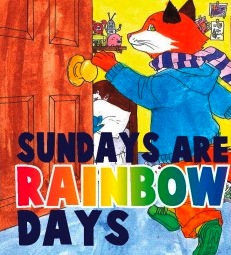Anne Light '00: Boosting Early Learning Skills

Sundays Are Rainbow Days was written by Anne Light '00 to help improve children's early learning.
Details
At first glance, Sundays Are Rainbow Days seems similar to other children's picture books, with its engaging story, colorful illustrations, and simple, declarative sentences. But the book, written by Boston pediatrician Anne Light '00, was designed for a specific purpose: to help parents improve their children's early learning skills and enhance their language development.
Sundays Are Rainbows Days is an initiative of the OEL (Optimizing Early Learning) Foundation, which Light founded in 2008. The organization builds networks of experts in early education to serve as resources for parents, doctors, and nonprofit groups.
While in medical school, Light became interested in early learning as a way to maximize the wellbeing of children. Studies (which are cited on the OEL Foundation's website) have shown that children who receive high-quality education at a very young age are more likely to earn higher degrees, and less apt to suffer from physical and mental illness. Light conducted her own research on the issue and began acting as an informal consultant for classmates and colleagues.
She came up with the idea for an organization that would offer structure for other consultants in the field.“There are many experts in early learning, and it's an untapped talent pool,” she says.“But it's sometimes hard for those who need them to gain access; they may cost too much, or be located too far away.” The OEL Foundation gives these professionals opportunities to offer their services in a flexible setting.
Sundays Are Rainbow Days, which was published in 2009, was created in conjunction with nonprofits Reach Out and Read, Artists for Humanity and Red Sun Press. The book guides parents through a process called dialogic reading, which enhances early language development by teaching parents how to have simple conversations with their children during shared reading time. In Sundays Are Rainbow Days, parents are cued to ask questions about the pictures in the book (i.e.“What is that animal?”), praise or correct their child's response, add information (“It's a big dog”), ask additional questions, and review all of the words.
“A child's brain develops best through interactions with adults, through direct questions and conversations,” says Light. She adds that only one in 20 children's picture books are suitable for practicing dialogic reading:“You need a book with very simple, spare text and realistic, rich and detailed pictures in vibrant colors, like Goodnight Moon by Margaret Wise Brown. Most children's books have storylines and illustrations that appeal to adults, but are too complex and abstract for young children.”
At present, Sundays Are Rainbow Days—in which a young fox defines each day of the week by a different color, and reserves Sundays for a“rainbow” palette of hues—is sold on The OEL Foundation's website and in Boston area bookstores. It can also be downloaded from the website in PDF form. Light says that reader response to the book has been“fantastic” so far:“It's a tough sell for parents at first, because it's a unique way to go about reading aloud, but kids love it. Some parents ‘complain' that their children want to read it every day, four times a day.”
In addition to testing responses to the book, the OEL Foundation is creating an online resource for pediatricians at Boston hospitals, as well as a comprehensive website for parents that will include access to videos and handouts. Fundraising is integral to the Foundation's success; the organization recently raised money to donate books to the national nonprofit Raising a Reader, which provides low-income families with book bags stocked with a rotating supply of age-appropriate books.“With our fundraiser, more than 2,500 families will receive a copy of Sundays Are Rainbow Days in their book bags during 2010,” says Light.
Visitors to the OEL Foundation site can donate copies of Sundays Are Rainbow Days to a local library or charity, as well as to Raising a Reader. They can also help fund the Parent Pages, a free, online early learning web page.
“We want to put knowledge out there in every way that we can to increase the benefits to children,” says Light.
-Brenna McBride



